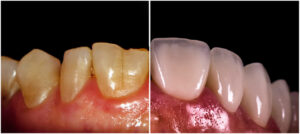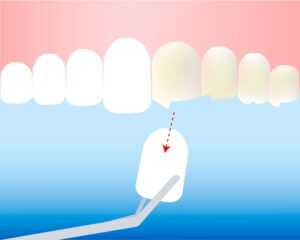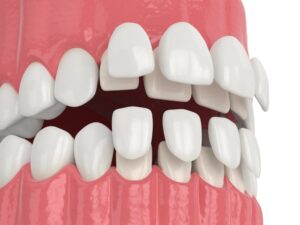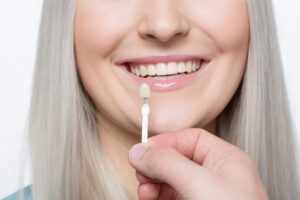It is normal that today many people wonder how long permanent dental implants last. Dental implants, thanks to their overwhelming success as a dental treatment, have gradually become the norm for oral restoration. They combine comfort, convenience, aesthetics, and something that concerns us here today: high durability, especially metal dental implants (although ceramic ones also last a long time). In this article, we are going to answer the question of how long permanent dental implants last, as well as give you some more details that will probably be of interest to you.
Miami Perfect Smile offers you long-lasting dental implants
If you have been looking for dental implant treatment in Miami, you have just come to the right place. At Miami Perfect Smile we make everything you need available to ensure you and your smile look renewed, fresh and healthy. In our center, you can get dental veneer treatments, smile design, dental implants, and more. By following the link we just inserted, you can contact us or schedule your first appointment and find out everything you need. We’re here to serve you!
We use the best quality materials and state-of-the-art technology to give you an aesthetic and natural smile. Your well-being is our goal. In our facilities, you will receive the careful and specialized treatment that you deserve. Review the opinions of our patients and check their satisfaction with our treatment. Having satisfied patients is our best letter of introduction.

We accept all types of insurance with which you are covered. And something very important: our prices are reasonable if you compare them with those of other states in the country. You can investigate, and you will see our excellent relationship between quality and price. It is worth noting that many people travel to Florida to undergo dental implant treatment in Miami. Despite the travel expenses, our prices are still more affordable than those in other states.
You May Be Also Interested in: All possible problems with dental implants and their solutions
Differences between permanent and temporary dental implants
In order to fulfill the objective of this article (which is to answer the question of how long permanent dental implants last), we will first explain, as quickly as possible, what they are and how they differ from “removable” dental implants and permanent dental implants. In general, it must be said that, among the types of dental implants, there are none that are temporary or removable.
What is understood today is that dental implants are always permanent, because the implant is inserted into the bone by threading or cementation, and gradually integrates with the bone tissue. After this osseointegration process occurs, it is as if the implant were part of the denture, so it is no longer removed. We reiterate that it is totally permanent, and neither the patient nor the dentist (unless it is necessary for some reason) can remove the dental implant.
However, some people call regular implants “permanent.” What happens in those cases is that these people call dental implants “temporary or removable” dental implants, especially dental prostheses (bridges, plates, etc.) that are placed on implants. These prostheses are not proper dental implants, but they can be temporary or permanent. For example, prostheses that are cemented or screwed to the implants are permanent, while prostheses or crowns that are placed on the newly inserted implant in the bone are temporary, with the aim that the patient has a certain ability to chew until permanent crowns are placed.
All this means that, in the context of this article, when we refer to “permanent” dental implants, we call them that, so that the reading public understands, and not because temporary or removable dental implants actually exist.
Answer to the question of how long permanent dental implants last
On average, permanent dental implants tend to last 15 or 20 years minimum . This is so when the patient maintains normal care regarding the implants. But on the contrary, if the person neglects the implants (in terms of hygiene, misuse of the denture, etc.), they can last less time, or significantly less time. The opposite of this is also true. If the person takes particularly good care of permanent dental implants, their duration can perfectly be doubled. This, among many others, is one of the reasons why dental implants are considered such a successful treatment.
There are cases where dental implants last 40 years or more. But in many cases, the truth is that, when perfect integration of the implant to the bone has been achieved, the implant can remain functional throughout the patient’s life. Dental implants have not been used for many decades as a treatment, so it is difficult to reach definitive conclusions on this point. To this should be added the duration of the dental crowns that are placed on the implants. It is normal that the crowns last less than the implants themselves (about 15 or 20 years, depending on their material), so new crowns can be placed on the same implants.
Factors that determine how long dental implants last
There are factors that can lengthen or reduce the duration of dental implants. Several of these factors are in the hands of the patient, while others are not. Some of the factors that determine how long permanent dental implants last are the following:
a) Type of material used for its manufacture
The most widely used material for all types of dental implants is titanium, because of its durability: it is the most durable. If the patient is not allergic to metals or titanium, the use of titanium dental implants is almost always recommended, precisely because they last longer, because they are stronger and a little less expensive than implants made of other materials.
Titanium implants have been used for more than 40 years, and forecasts estimate that they will continue to be used for much longer, due to their versatility, biocompatibility, and high resistance. According to Sarah Janer, GlobalData Medical Device Analyst: “The titanium dental implant segment will continue to grow strongly due to the material’s biocompatibility, strength, versatility, and cost. Zirconium implants will also show growth, but this will be limited by issues that limit their durability and placement.” (Source: Dental implants market projected to reach $5.9bn by 2028. )
Titanium implants are by far the most used today (more than 95% of implant treatments are performed with titanium). However, there are also zirconium (zirconium or zirconia) dental implants, as well as other materials that have already been discontinued, because they are not as suitable as these. Zirconium implants entered the market much more recently than titanium implants. In general, zirconium implants are considered to last a little less than titanium implants and to cost a little more. But since there are people with allergies to metals, in those cases there is no choice, and zirconium implants are almost always fitted.
b) Quality of the materials used
In dental implants, as in any prosthetic medical treatment, durability is also subject to the quality of the materials themselves, regardless of whether it is titanium or zirconium. In this case, the important thing is: what kind of titanium or what type of zirconium were used to manufacture the implants? Depending on this, permanent dental implants will last less or more time.
c) Comply to the letter with the waiting periods prescribed by the doctor
Dental implant treatment is usually long. At a minimum, it will last about 3 months (from when the preliminary studies of the patient’s oral health begin to be carried out until the dental crowns are finally placed on the already osseointegrated implants). But the treatment can also be extended up to 6 months, or even 1 year. It all depends on the complexity of the procedure that each patient requires. While the treatment is not finished, the doctor will prescribe certain limitations (on diet, ways of eating, use of dentures, etc.) If these medical prescriptions are followed to the letter, the duration of dental implants will be extended. Otherwise, the durability may be shortened.

d) Usual care of the person with respect to implants
We will talk about the type of specific care that allows the duration of permanent dental implants to be extended in a later section within this same article. Here let’s just say in passing that, depending on the care that the patient gives the implants, they will last longer. The care is related not only to maintaining correct daily oral hygiene, but also to not eating hard foods and not using the denture as a tool to hold or break objects, strip wires, etc.
e) Professional level of the personnel that carries out the treatment
As the complete treatment of dental implants is one of the most expensive, most patients always look for offers that are as economical as possible. This is totally understandable. However, along with finding economic offers, the patient should make sure of the quality of the clinic where he will receive the treatment and the professional level of the technical staff. Because it is such a lucrative procedure, technical personnel sometimes risk doing it even if they are not fully trained. The person who is going to receive dental implant treatment should investigate the quality and the opinions that patients express about the medical institution where the dental implants are going to be fitted.

Do dental implants hurt?
The dental implant placement procedure itself does not hurt. The small surgical intervention does not go beyond making a cut in the gum to insert the implant in the maxillary or mandibular bone, so it is considered an outpatient operation. For this, the patient is given local anesthesia, although in some cases general anesthesia or oral sedatives can be administered.
During postoperative recovery, the patient may feel some pain, but that is normal for a procedure like this, which, no matter how minimally invasive it may be, will always be painful to some extent. However, the doctor will prescribe pain relievers that will help eliminate the pain, which on the other hand should not last more than a week or 10 days. If the patient complies with all the hygiene and nutrition recommendations of the dentist, the pain will be minimized.
After the postoperative period, permanent dental implants should not hurt at all. In fact, they are usually so comfortable that the patient forgets that they are wearing them. This is true for all types of dental implants.
You May Be Also Interested in: All possible problems with dental implants and their solutions
Some tips to extend the life of permanent dental implants
As we said a few lines above, permanent dental implants are usually so comfortable that the patient even forgets that they are wearing them. This comfort can have two sides. On the one hand, it is tremendously positive that the implant integrates so well with the bone that its presence is no longer noticeable in a place as sensitive as the mouth. This implies a great gain in terms of aesthetics, functionality and comfort.
However, the other side of this is that thanks to the same comfort that this type of treatment makes possible, the user trusts it and is not constant in following the type of care that is recommended. The truth is that excessive care is not needed with permanent dental implants. In fact, they are not very different from the normal care that must be taken with natural teeth. But since people don’t always take care of natural teeth, they may not take care of implants either.
And one of the aspects that are affected if the person does not take good care of the implants is their durability. The duration of permanent dental implants can be doubled, or even longer if the person follows care routines such as those recommended below:
a) Make at least one annual visit to the dentist
Dental implants are a permanent treatment that do not require much follow-up. However, it is recommended that you make one or two annual visits to the dentist. The annual visit to the dentist is also recommended for natural teeth, although people do not comply much with this. So if, in general, you were not in the habit of visiting the dentist once a year, maybe you should if you have had dental implants.
b) Postoperative care
During the first days after the surgery to place the implants, it is important to eat soft or liquid foods, and that they are at room temperature or even cold. It is better not to eat hot food but food which is at room temperature during the first 6 weeks after the intervention. Food at room temperature, and especially cold foods, will prevent pain and bleeding that may hinder wound healing, while hot foods will do the opposite and promote osseointegration. Adequate osseointegration of the implants implies a greater durability for them.
c) Maintain normal oral hygiene (and a little extra)
Dental hygiene is of the utmost importance to preserve dental implants and avoid long-term complications. Long-term complications (such as infection, inflammation, bleeding or implant failure) can reduce the effectiveness of the treatment and the durability of the implants. In fact, when dentists notice a significant lack of oral hygiene in the patient, it is one of the reasons for discouraging the use of implants. The solution for dental implants to last in cases of patients with poor oral hygiene is hygiene education.

d) Avoid smoking and alcoholism
Smoking and alcoholism are destructive practices for health. This is especially true for dentures, not only in aesthetic terms but also functionally. Alcohol and nicotine are substances that degenerate teeth and can ultimately destroy them thoroughly. Smoking is another of the reasons from which dentists can advise certain patients against the use of dental implants. For some people, the desire to recover lost teeth becomes a stimulus to temporarily or permanently abandon harmful habits such as alcoholism and smoking.
e) Give up harmful dental habits
When wearing dental implants, it is best to abandon habits that are destructive to the teeth, such as:
- Onychophagia (biting or eating nails)
- Bruxism ( unconsciously clenching, compressing or grinding the teeth while asleep or awake ).
- Biting or chewing on objects such as pencils, pens, pens, wood or plastics, etc.
- Using teeth as tools (stripping wires, opening containers, holding objects to do work on them, loosening nuts, opening bottles, etc.)
All those bad habits are very harmful for the implants. The truth is that they can also damage natural teeth.
f) Do not eat food that is too hard or sticky
Some foods are too hard for dental implants. Depending on the case, you should avoid these foods, or simply moderate their consumption, or in any case chew them carefully. Some of these foods are:
- roasted seeds
- certain nuts
- hard nougats
- some cookies
- loaves of stale bread
- fried pork skin (whether crispy or not)
- some types of snacks or treats, etc.
- animal bones or ice cubes







